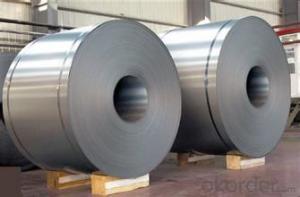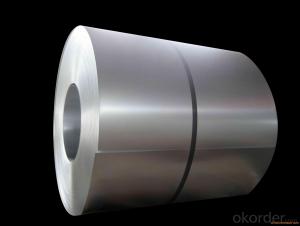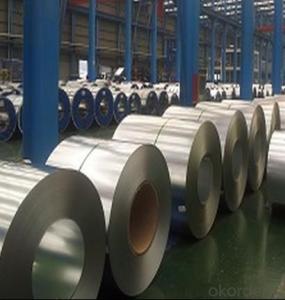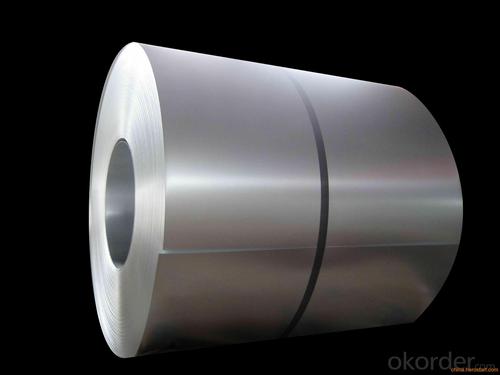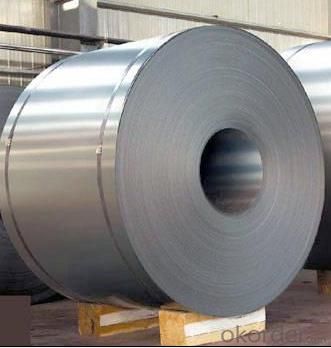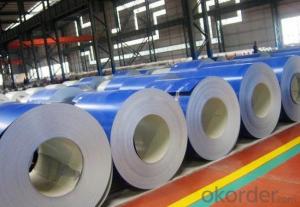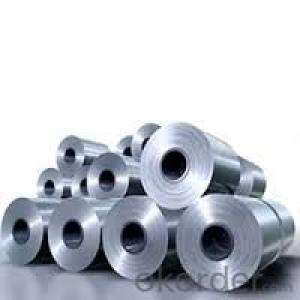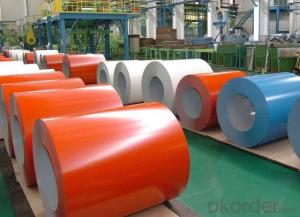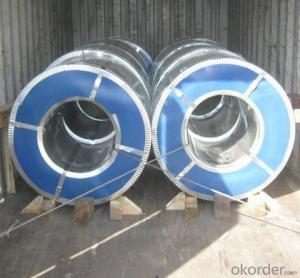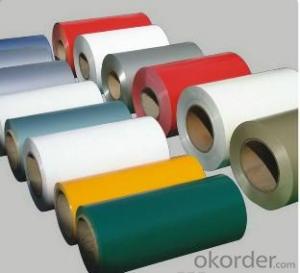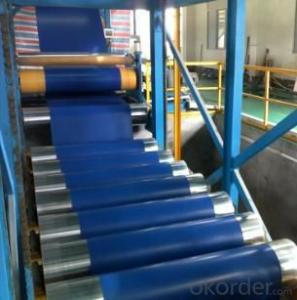Colored Coated Galvalume Steel Coils for Building Materials
- Loading Port:
- Shanghai
- Payment Terms:
- TT OR LC
- Min Order Qty:
- 25 m.t.
- Supply Capability:
- 10000 m.t./month
OKorder Service Pledge
OKorder Financial Service
You Might Also Like
| Standard: | AISI,ASTM,GB,JIS | Grade: | CGCC CGCH | Thickness: | 0.17-0.6mm |
| Place of Origin: | China (Mainland) | Brand Name: | Model Number: | GL-001 | |
| Type: | Steel Coil | Technique: | Cold Rolled | Surface Treatment: | Coated |
| Application: | Container Plate | Special Use: | High-strength Steel Plate | Width: | 750-1250mm |
| Length: | C | certificate: | SGS,BV,ISO | usage: | building roofing material |
| coil weight: | 3-7 ton | coil ID: | 508mm | base metal: | hot rolled steel coil |
Packaging & Delivery
| Packaging Detail: | mills standard export seaworthy packing or according to the customers' requirements |
| Delivery Detail: | 30days |
Galvalume Steel Coils/Coil
Product advantages:
A.high strength
B.strong soundess
C.well rainproof performance
D.continuous rolling
E.good corrosion resistance
F.easy to install and remove
Quality guarantee:
our company attaches importance to quality management and assurance,it is equipped with sound testing means and has passed the certification of ISO9001 Quality Management System and SGS,BV verification
Deiverse products
With world high-quality galvanized,aluminum and zinc coated and cold-rolled steel coils as base materials.
- Q: What are the common methods of packaging steel coils for transportation?
- There exists a variety of conventional techniques for packaging steel coils for transportation. One frequently employed approach involves the utilization of steel strapping or bands to fasten the coils together. This method entails tightly encircling the coils with steel bands and securing them using metal buckles or seals. The strapping serves to maintain the coils in position and prevent any shifting or rolling during transportation. Another popular technique entails the use of wooden pallets or skids to stack and transport the steel coils. The coils are positioned onto the pallets and secured with steel strapping or bands. This approach ensures stability and facilitates easy handling and loading onto trucks or other means of transportation. Furthermore, certain steel coils are enclosed within wooden crates or boxes. These crates are typically constructed from robust and durable wood and are designed to shield the coils from external impacts or damage during transportation. To enhance strength and stability, the crates are frequently reinforced with steel bands or strapping. In addition to the aforementioned methods, specialized containers or units are employed to package certain steel coils. These containers are specifically engineered to accommodate and secure steel coils for transportation. They often possess integrated mechanisms or features that facilitate the loading and unloading of the coils in a safer and more efficient manner. It is important to acknowledge that the particular method of packaging steel coils for transportation can vary depending on factors such as the size and weight of the coils, the mode of transportation, and any specific requirements or regulations that may be in effect.
- Q: The guy at this one pawn shop told me that stainless steel is better because it is just as strong and will not rust. The guy at the other pawn shop said that you need high carbon steel for a good sword because stainless steel breaks easily and that damascis is the best kind of steel for swords.
- The decorative swords you buy are actually blunt. my brother bought a set and they were blunt. Also some of the swords you buy in the shops like the previous person said are for decorative use only. A real Samurai sword cost a lot more than 30 dollars. The program I saw on TV was about these swords and they said that they cost about 1000 dollars or more for the real thing. 30 dollars is very cheap for a sword also the machete is a wider blade compared to the samurai which is why it's probably stronger.
- Q: Aluminum and Steel brittle or ductile based on these results? and why? Steel Aluminium% Elongation 0.2510.2705Modulus of E in ksi11833.33964.71Tensile Strength (ksi)87.5 51.5Yield Strength (ksi)78.5 41
- Only steel(of this pair)might be liable to brittle fracture,which would be implied by almost zero elongation or reduction in area at fracture.On this basis the steel has not failed by brittle fracture.I would expect much more elongation in pure aluminium than your sample shows so I presume it to be brittle unless it is an alloy rather than commercially pure aluminium.However brittle fracture in metals is a particular phenomenon to be determined by impact tests and examination of fracture surfaces and is particularly relevant to metals with the body centred crystal structure.
- Q: Can steel coils be stored in a corrosive environment?
- Ideally, steel coils should not be stored in a corrosive environment as exposure to corrosive elements can lead to degradation and damage to the steel surface. Corrosion can weaken the structural integrity of the coils and affect their performance. To ensure the longevity and quality of the steel coils, it is best to store them in a dry and non-corrosive environment.
- Q: How do steel coils contribute to the automotive industry?
- Steel coils are a crucial component in the automotive industry as they are used to manufacture various parts of vehicles, including the body frame, doors, hoods, and chassis. The high strength and durability of steel coils make them ideal for enhancing the safety, structural integrity, and overall performance of automobiles. Additionally, steel coils are cost-effective, readily available, and can be easily formed into different shapes and sizes, making them an essential material in the production of cars and trucks.
- Q: Also, what is the top best slow cooker that is 100% stainless steel? Thank you!
- You do not want 100% stainless steel cookware, because it's a poor conductor of heat. All high quality stainless cookware is layered with stainless steel only on the exterior and interior surfaces, while having at least an internal heat spreading core of aluminum or copper. Not all stainless steel is sufficiently ferrous (magnetic) to work with electric inductive cooktops, so some stainless cookware adds an additional layer of ferrous steel in addition to the thermal cores. You also wouldn't want a slow cooker that's 100% stainless steel, because the uneven heating would cause food to burn more quickly. They are usually made of ceramic stoneware for a reason, even heating. Besides, a stainless pressure cooker (with alum/copper) core can in less than an hour everything a slow cooker does in 3+ hours, with better flavor, color, and nutritional content. By the way, the Prestige stainless cookware isn't 100% stainless, of course, and that's a GOOD thing.
- Q: How can steel coils be recycled?
- Steel coils can be recycled by first cleaning and removing any contaminants from the surface. Then, they are shredded into smaller pieces and melted down in a furnace. The molten steel is then formed into new coils or other steel products. This process helps conserve natural resources, reduces energy consumption, and minimizes waste.
- Q: How are steel coils used in the production of electrical transmission towers?
- Various methods are employed in utilizing steel coils for the manufacturing of electrical transmission towers. Firstly, these coils are frequently employed in the production of the towers' structural components, including the main support columns and crossarms. To effectively bear the weight and strain of the transmission lines, these components necessitate strength and long-lasting durability, which steel coils aptly provide. Furthermore, steel coils are also instrumental in the creation of brackets and braces that reinforce the transmission towers. These particular elements contribute to the even distribution of the load and offer supplementary support to the structure. Steel coils can be molded and welded with ease, rendering them well-suited for the intricate fabrication of these components. Additionally, steel coils find extensive application in the construction of the foundation and anchor bolts that secure the transmission towers to the ground. It is vital for these bolts to possess robustness and resistance to corrosion, as they play a pivotal role in upholding the stability and integrity of the entire tower structure. To enhance their longevity and prevent rusting, steel coils are often subjected to galvanization or other protective coatings. In summary, the indispensability of steel coils in the production of electrical transmission towers arises from their exceptional strength, durability, and versatility. These coils enable the construction of robust tower structures capable of supporting the weight of transmission lines and withstanding diverse environmental conditions.
- Q: What are the environmental impacts of steel coil production?
- The environmental impacts of steel coil production include the extraction of raw materials, such as iron ore and coal, which can lead to deforestation, habitat destruction, and soil erosion. The steel manufacturing process also releases significant amounts of greenhouse gases, such as carbon dioxide, contributing to climate change. Additionally, the production of steel coils requires large amounts of water and energy, leading to water scarcity and increased carbon emissions.
- Q: What is the standard diameter of steel coils?
- Depending on the industry and application, the standard diameter of steel coils may differ. Generally, steel coils have a standard diameter that falls between 24 inches and 72 inches. This range enables convenient handling, transportation, and storage of the coils. It is worth mentioning that various industries may impose specific requirements for steel coil diameters, taking into account factors like equipment compatibility, production processes, and logistical considerations.
Send your message to us
Colored Coated Galvalume Steel Coils for Building Materials
- Loading Port:
- Shanghai
- Payment Terms:
- TT OR LC
- Min Order Qty:
- 25 m.t.
- Supply Capability:
- 10000 m.t./month
OKorder Service Pledge
OKorder Financial Service
Similar products
Hot products
Hot Searches
Related keywords
